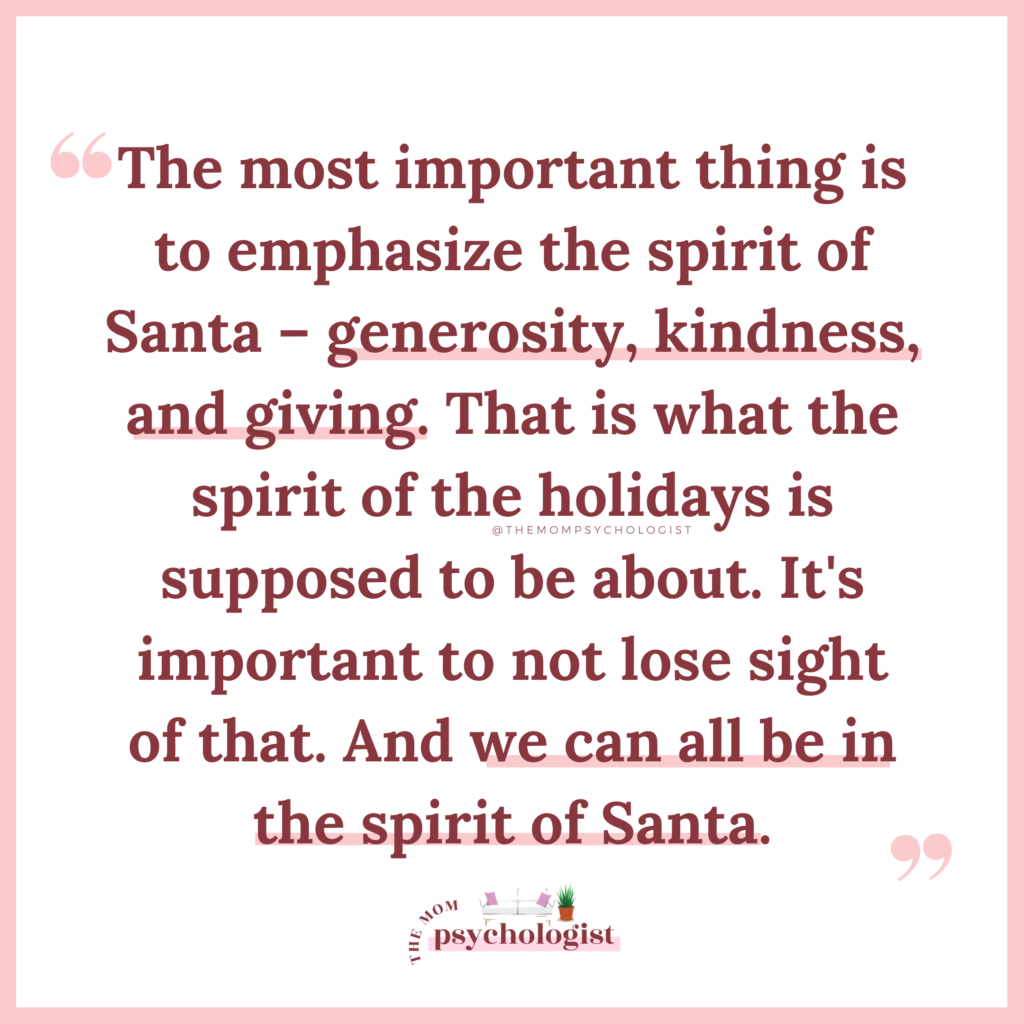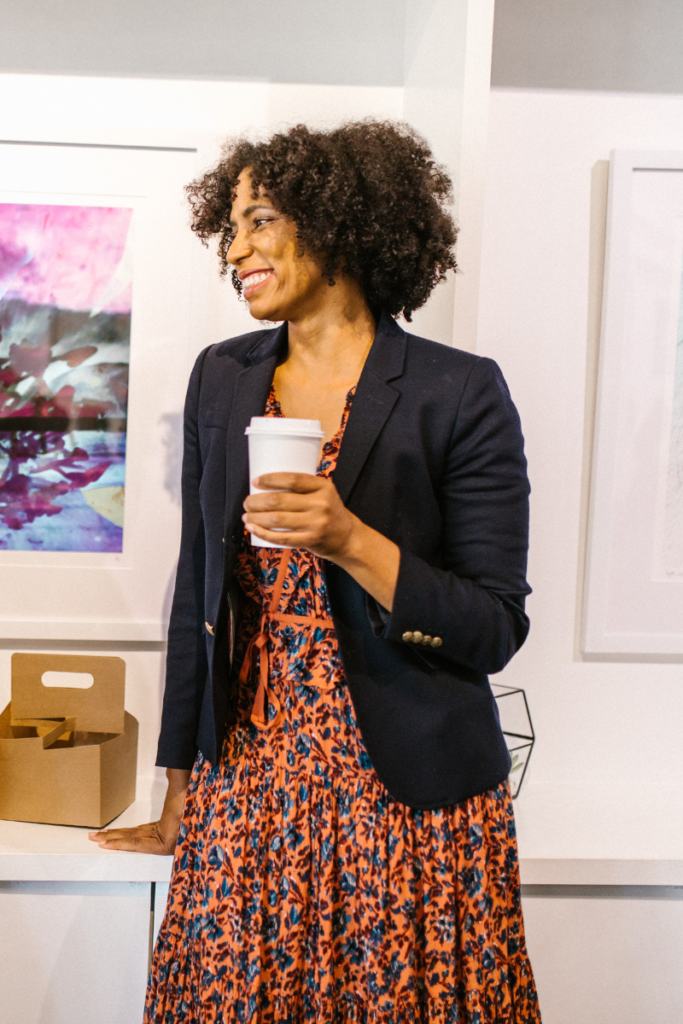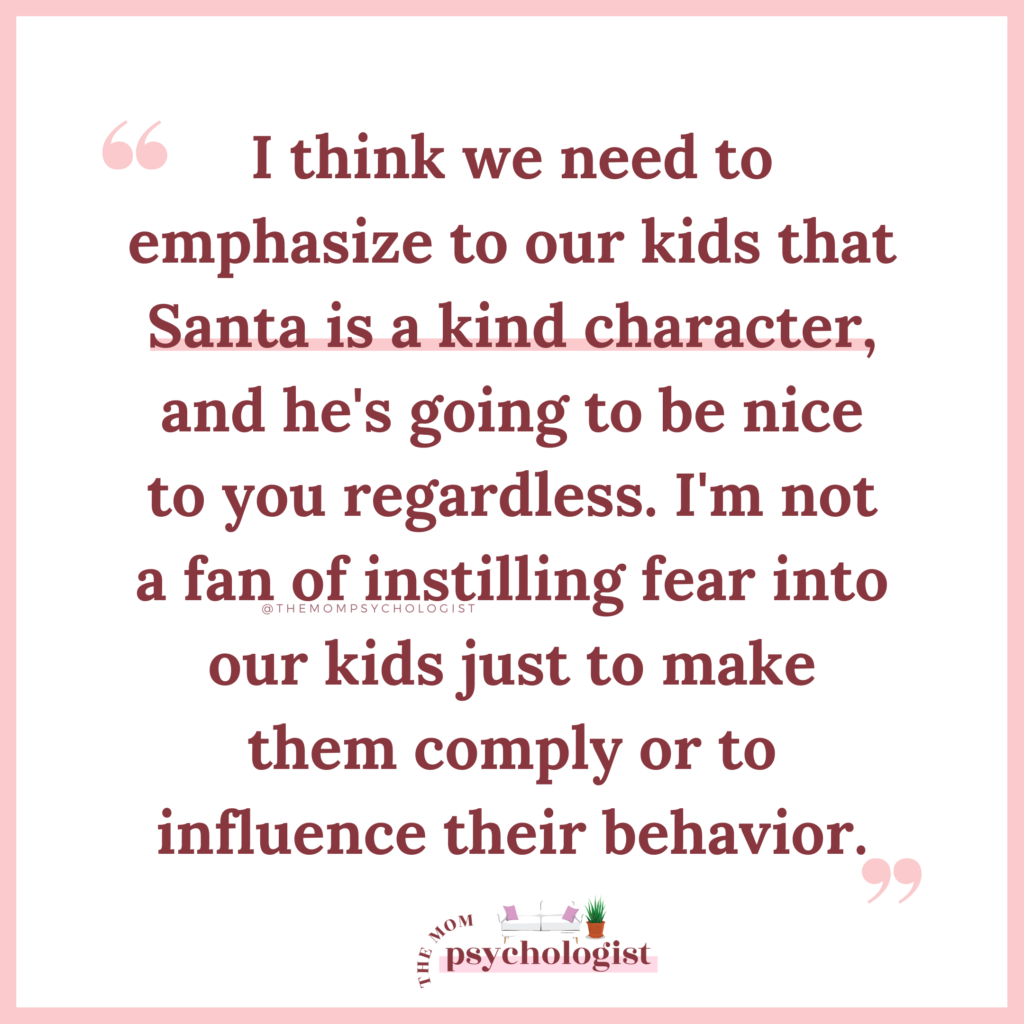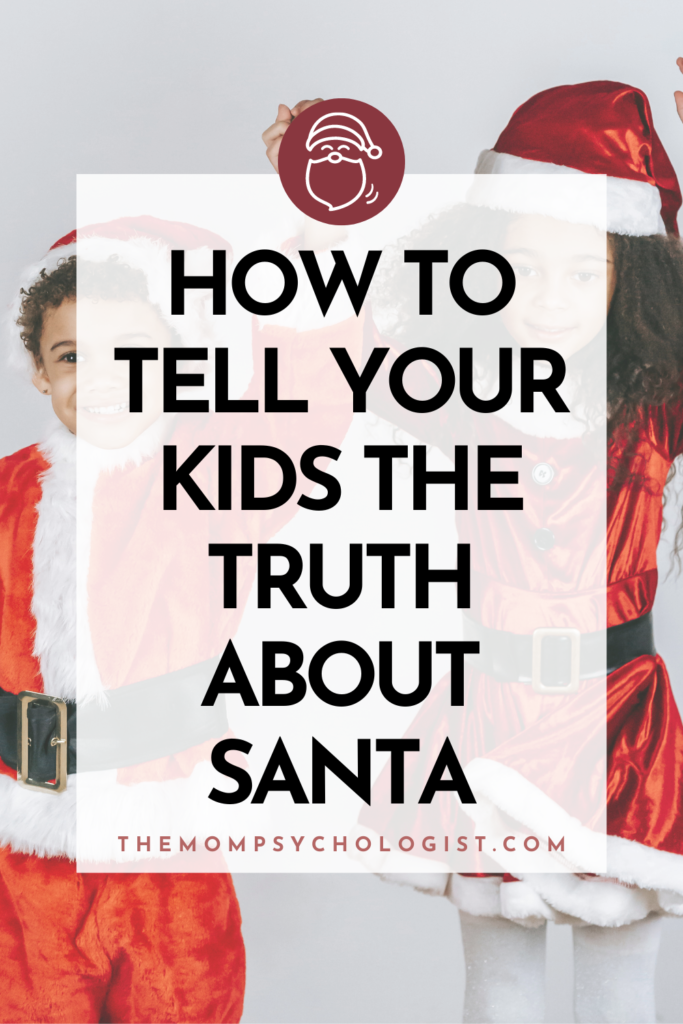watch now!
A place where I discuss all things related to toddlers and motherhood!
Subscribe to my Youtube channel
As a clinical psychologist, published author, and mother to two cheeky young children, I get it. I’ve spent YEARS researching and filtering through the noise online, so you don’t have to.
PARENTING TIPS
POTTY TRAINING
ANTIRACISM
PLAY
Blog Topics
SIBLING RIVALRY
SCREEN TIME
TANTRUMS
DISCIPLINE
Hi I'm Dr. Jazmine
How to Tell Your Kids the Truth About Santa
topics:
I’m going to share with you my general thoughts and approach to Santa Claus – and how I navigate the truth about Santa with my children. Parents often wonder how to respond to questions about Santa? Another common concern is how to prevent our kids from ruining it for other children if you’re deciding not to participate in Santa Claus.
I’m going to answer all that and more for you. Let’s dive in!

Should I tell my kids Santa is real?
Every family has to make this decision for themselves because how you approach it is up to you. You get to raise your children how you want to, as long as it’s not abusive, neglectful, or cruel. So when it comes to Santa Claus, every family has the liberty of deciding how to best navigate it in ways that are aligned with their values, beliefs, and their child’s needs. There’s no right or wrong way to do this.
The most important thing is to emphasize the spirit of Santa – generosity, kindness, and giving. That is what the spirit of the holidays is supposed to be about. It’s important to not lose sight of that. And we can all be in the spirit of Santa.
If I tell my child Santa is real, won’t it create trust issues for my child?
I believe this is something that can be managed with how you talk about Santa when your child starts to ask questions. But if you’re concerned, then by all means, do what’s right for you and your family.

How do I talk to my child about Santa if I decide we aren’t going to believe he’s real?
Tell your child Santa is a fictional character people like to believe in – like the Easter Bunny, mermaids, or unicorns. You can stress that this is pretend, and we can choose to believe in it or not. Tell your child some people like to believe and pretend Santa is real.
But you can still incorporate Santa in a way that’s pretend with your child. You can still say, “Let’s pretend Santa is real and make him cookies,” or “Let’s pretend Santa’s going to read our Christmas list, and let’s make a list of all the toys that we want.” You can still incorporate Santa and also be truthful that he is a pretend character.
If I tell my child Santa isn’t real, won’t I ruin the magic of Christmas?
No. If we’re honest with our kids that Santa is a fictional character that we can choose to believe in or not, we’re not ruining the magic. Because here’s the thing: Kids love to imagine. All day long, your child is engaged in pretend play, and it’s fun for them. For instance, just because your child knows they’re not actually a mom doesn’t distract from the fun of pretending to be mommy during doll time.
You can still have a magical Christmas because it’s all about embodying the spirit of Santa – embodying generosity and kindness. So telling the truth will not ruin the magic for your child during Christmas.
And there are so many ways to embody the magic of the holiday season outside of Santa. You and your child can:
- Bake holiday cookies together
- Go for a walk and look at all the Christmas lights
- Make homemade gifts for family & friends
- Volunteer at a food bank or other cause
- Come up with ways to treat people with extra kindness


Is it okay to tell kids to behave because Santa is watching or the Elf on the Shelf is watching?
Whether you’re telling your kids Santa is real or not, it’s important to be clear that Santa will always be kind. I’m not a fan of the nice & naughty list or that Santa’s watching and knows if you’ve been good or bad. Or the idea of the Elf being a spy for Santa.
We need to emphasize to our kids that Santa is a kind character, and he’s going to be nice to you regardless. I’m not a fan of instilling fear into our kids to make them comply or to influence their behavior.
How do I tell others we don’t participate in the naughty or nice list, Elf on the Shelf, or those other things?
Be straightforward and respectful in the way you tell people. It’s opening up a conversation about your beliefs and why you think it’s important. You can say:
- “We don’t believe we should manipulate kids into being good one month out of the year. I don’t think we should manipulate them to do something so they can get a gift. Those are not the values we believe in.”
- “I believe we should encourage our children to make good choices. I think we should teach them responsibility, self-discipline, and how to develop intrinsic motivation instead of encouraging them to have this extrinsic or external motivation for gifts. And I believe that’s our job as parents to work ourselves out of a job and teach our child how to discipline themselves.”
- “I never want my child to feel like my love for them is conditional or that it’s based on them being good or not. We all make mistakes. I am not a fan of the whole mentality that Santa Claus knows you’ve been good or bad. It feels like we’re trying to manipulate kids to be good.”

At what age should I tell my child the truth about Santa? What should I say when I talk to my child about Santa not being real?
There’s no magical age for this. But the age range of when kids start to ask questions is around 7 to 10 – the average age of when kids figure out Santa isn’t real is 8 years old.
If you’ve been saying to your child Santa is real, when you tell them the truth about Santa is going to be based on your child and the questions they ask. So if they ask you, “How do reindeer fly?” Or, “How does Santa get inside my chimney?” Or “How does he get to all the houses in the world in one night?” That’s when it’s time to have those conversations.
For instance, if your child asks, “Is Santa real?” start with asking them back a question:
- “What do you think? Do you think he’s real?”
- “What makes you ask that?”
Start with some curiosity. And it’s not that you’re trying to deflect or not answer their question, but I want you to start with some curiosity because that will inform what you’ll then say later.
So if your child then says, “I don’t think he’s real,” that’s a great time to say:
- “Yeah, he’s not real. It’s a character we like to pretend is real, and it’s part of the magic of Christmas. “
Talk about the spirit of Santa and why people like to pretend he’s real. Go back to the values of generosity of kindness that Santa embodies.
If your child says, “I don’t know,” or “I think he’s real,” then you can decide if you want to continue that narrative. It’s also okay for you to allow them to come to their own conclusions in their own time.
If your child says, “No, tell me, is he real or not?” I wouldn’t lie. I would say, “No, he’s pretend.”
Of course, the way you have this conversation and the things you talk about are going to depend on your family values and beliefs and what you hope your child will learn from this experience.
Some families like to talk about the spirit of Christmas still being alive and others like to dive into the true meaning of Christmas. Some parents like to tell kids Christmas is all about giving, and that now that they know the truth about Santa, they can embody Santa. They can embody Santa’s spirit and give back to others. So there are different ways to approach this and no approach is right or wrong.

How do I help my older child understand Santa isn’t real without lying? What if I think my older child knows Santa isn’t real? Should I bring it up?

As your child gets older, they’ll start to ask questions and engage in more critical thinking about Santa. You want to encourage your kids to think critically because they’re going to start thinking about how a man riding around in a sleigh is delivering presents all around the world. How does he get to everybody in one night? How does he fit through our chimney? What if someone doesn’t have a chimney?
And these critical thinking questions about Santa are a good thing. This is when you have conversations with your child about Santa Claus. We don’t want to lie to our kids to convince them to continue to believe in Santa when they’re showing signs of critical thinking. This can be harmful.
If your child is much older, like 10 or 11, they probably already know by this point that Santa isn’t real. But if you’re not sure and you want to open up a discussion with them, you can ask by leading with an open-ended question.
- “What do you think about Santa Claus?”
- “Are there any questions you have about Santa Claus?”
How do I keep my child from telling other kids Santa isn’t real and spoiling it for them?
It’s important to have this conversation with your child, and it comes down to prepping them beforehand when it’s clear they no longer believe in Santa. This doesn’t mean your child needs to lie. But instead, they need to keep quiet.
If other kids talk about Santa, you can tell your child they can:
- Excuse themselves from the conversation
- Stay quiet and not participate in the conversation
- Share a memory of Santa
But it’s important to emphasize to your child to not ruin it for other little ones.
And this all comes down to treating people with kindness and respect for what they believe. It’s like religion – some people choose to believe certain things and some people don’t. And that’s okay. If they’re choosing to believe in a certain religion, we can respect it. We’ll never want to say their belief is wrong. And that’s the same concept you want to teach your child to respect others’ beliefs about Santa.

Remind them Santa is all about kindness and generosity. Help them understand each family believes things differently, and that’s okay and beautiful – this helps us continue these conversations about diversity and differences. And we can celebrate differences even when it comes to Santa.
It’s also important to tell your child if they ever get a question from another kid saying, “Do you believe Santa’s true?” Teach your child to direct that other kid’s questions to an adult. Tell them they can say something like:
- “Oh, that’s a good question. I think you should ask your parents about that.”
We never want them to feel the burden or responsibility to answer these types of pointed questions. So give them the words to handle those conversations.
How can white parents incorporate multicultural Santas without being insensitive?
We all should incorporate multicultural Santas into how we talk about Santa and how we integrate him into our home. It’s important to celebrate diversity in our homes. Everybody should have multicultural Santas, just like we have multicultural dolls, books, and TV shows. It’s all inclusive and how we live our lives.
It’s only insensitive if you don’t care about other people’s feelings. But if you’re incorporating multiculturalism and diversity in your parenting, that’s the opposite of insensitivity because you’re being inclusive.
How are you planning on handling Santa Claus this year?
Leave me your thoughts in the comments below. Let’s share our ideas, traditions, and more – remember, we’re a community of parents all doing the best we can as we navigate the holiday season!
Happy Holidays,
Dr. Jazmine
P.S. Ever wonder what type of parent you are? Like do you tend to be more permissive, authoritarian, or do you strike a balance between love & limits (authoritative)?

Take my Parenting Style Quiz and find out! All you need is 2 minutes and an email address.
Once you complete the quiz, I’ll send you a personalized report and video with your results. You’ll receive several resources that will help you grow to create more cooperation and connection to transform your relationship with your child.
Love this? Don’t lose it!
Click below and save it to your Pinterest!

Leave a Reply Cancel reply
Copyright The Mom Psychologist® 2025
grab my free script pack!
explore
work with me
information
About
Blog
YouTube
Podcast
Discipline Course
TMP University (Coaching)
Privacy Policy
Terms of Use
Product Disclaimer
Contact
TMP Times (Newsletter)
Thank you for this blog. Quite honestly, I am tired of creating the Santa/Elf experience and I feel my 9 year olds are old enough to know the truth. This truly gives me a considerate way to start the conversation with them.
I have an 11 and 9 year old. My older child always believed in santa, I am pretty sure my younger child never believed. I have kept up the believing in santa because I want it to be magical for them and I love “believing” even though I am an adult. My mom always told me that Santa is the spirit of christmas. My children have just recently been asking “is santa real” and last night I got a “mom, is santa real? Does he put the presents under the tree or is it all you?” I wasn’t prepared for this question and just said “of course he is real, he is the spirit of christmas.” and I smiled at her. I am not sure what she thought. And I am not sure what I think about how I handled that. I wish I could have done it differently now but I didn’t want to upset her or her younger sister that was right there. Should I bring it back up or just let it lye?
I have twin 11.5 year olds who believe. That’s for these awesome tips to help me open the conversation and keep the idea special
This was really helpful thank you but i’m onley in 2nd grade some there were some words i did not now but it was really helpful thank you soooooooo much! bye
My child is only 2 and she’s in a really culturally diverse friend group at her creche. She’s starting to get excited about Santa and i want to keep that magic alive for a little while but I’m not sure how to navigate the fact that Santa doesnt visit her Muslim pals without just saying Santa doesn’t visit all kids for some reason which is obviously confusing and weird for her. Side note we’re a totally secular family so Santa has no religious affiliation. We love talking about different customs and religions with her but I’m a but stuck on how to talk about this while still being culturally sensitive and not making Santa seem like an exclusive weirdo…
I feel bad for kids who think that Santa is real but the truth is that because it doesn’t exist but you can still believe and I think they should hide this website.
This was really helpful thank you but i’m onley in 2nd grade some there were some words i did not now but it was really helpful thank you soooooooo much! bye
I told my 10-year-old that Santa wasn’t really because he had said it for many years and I felt I had to allow for the truth, thereby following the example of a friend I much admire who said her son had been relieved when she told him. My son is now bitterly disappointed and says Christmas is ruined. Clearly I handled this incredibly badly and feel very guilty. I will try to bring up the points your raise her. His face was so shocked when I told him, though I was convinced he didn’t believe in him.
My older son who is 12 asked if Santa was real and I told him I thought it was time he knew the truth. I said Santa has elves and we are a special secret society who can make magic for other children. None of this helped. My son was devastated and still is. We talked about how Santa is just a small piece of Christmas and it’s more about giving and spending time with your family which he understands, but now he tells me he can’t trust me and I was the only person who he could trust. What can I do from here?
I will be trying to make this website be takin down because kids should have to see this and think santa isn’t real and my 8 year old told me about this website and she believed this goofy website I told her this website is fake and Santa is real all you goofahhs. Take the L website I ain’t telling no kid Santa ain’t real you almost ruined my daughters Christmas.
Lying to your child is ridiculous. “Santa” is not real, but JESUS certainly is
SANTA IS REAL BE QUIET 🤫🤫🤫🤫🤫🤫🤫🤫🤫🤫🤫🤫🤫🤫🤫🤫🤫🤫🤫🤫🤫🤫🤫🤫🤫🤫🤫🤫🤫🤫🤫🤫🤫🤫🤫🤫🤫🤫🤫🤫🤫🤫🤫🤫🤫🤫🤫🤫🤫🤫
you might still believe but some moms and dads need to tell there kids you can not decide for them so some do not tell there kids and some do and if you still believe in him you should not be on here sorry someone had to say some thing🎄 chrismas is about Jesus and his berth not Santa and gifts.
My ex spouse told my 5 year old daughter that Santa isn’t real without any conversation or consent from me and I am devastated. She is now telling all the other children in her school and community because she is far too young to understand the nuance of not ruining this for other children. I didn’t know he had done this and have been reiterating to her that Santa is real. :-/ I feel like I need to choose between ruining Christmas for her and the other children or undermining her Dad to try to keep the magic alive for her and others until an appropriate age. Any advice on how to handle this?
Hi, Jehovah’s Witness here with a hubby who doesn’t belong to any religion. Second year I’ve visited your site. Great information on how to explain Santa is a fictional character people pretend is real to help them create magic on this holiday. And on helping me prepare him him to not ruin it for other kids (he’s 5 now).
Time to leave “Santa” behind forever. CHRISTmas is about the birth of Jesus Christ.
My son is 12 and fully believes in Santa. He knows some people don’t believe in santa but thinks they are just wrong and he is right. I feel like he is the age where maybe I should be telling him the truth (way after this christmas of course) but I think I’m going to break his heart. He is autistic but has no other learning disabilities doesn’t believe in other magical things except the tooth fairy. I feel like if I don’t tell him he’s going to be waking around at 20 still believing, it’s cute when he is young but when he starts working to having relationships people will just laugh at him. How do I approach this?
My kids still believe, 15, 13, 9 and 7.
2 of them have special needs to I’ve kept it alive with them all for now, they all keep telling me that they believe.
My only concern is my daughter who is 15, she is one with special needs.
I’d hate for her to be ridiculed for it from her peers. Maybe thinking what she says after this year and go from there.
My 13 year old is another with special needs, he acts like he is about 7 some days so I’ll keep it alive with him.
if you are a mom or a dad it might be hard and some times not so easy but I am 11 years old and DON’T just say Santa is not real and then walk away because that is what my mom and dad did to me and I did not believe them until I was 11 years old they told me when I was 4 AND I WAS TO YOUNG so at least if you tell them do not tell them until they are at least 8 years old PLEASE☹
Hi how are you doing today I hope you are doing well your north pole
It was almost as devastating to me as it was to my 9 year old. He believe ,until his friends father decided that Santa was pagan. My grandson lives with me, he didn’t say anything just took what was left out and went to his room
If you think about it, it’s gaslighting the child, for at least a decade (so that you can personally feel some magical experience as an adult)
Then you have to break the news to them that it was all in just good fun.
If you think about it, it’s the first lie our children are told. I don’t think that’s healthy psychologically for any human being to start their life with a life.
And furthermore, if you think about it, that’s why some adults to this day in their lives have trust issues.
their life started out with a lie told by the people that love them the most.
Just my thoughts
Spoken like a true United States Christian. The solutions you offer here are exactly the problems. You should never teach your child something that is patently false, only to recant it a few years later. Not only will the child figure out the truth later, but may wonder what else is a “lie”. My kids enjoyed decorating the house, inside and out, and we had a home that stood out during Christmas. However, as soon as they were old enough to speak and understand, I told them the truth from the very beginning. Christmas and everything connected to it is either religious or commercial, (mostly commercial). Kids are smarter than you think. They catch on to faulty concepts because faulty concepts become self evident as time passes (eg. flat earth). My comments are not meant to berate, but to give an alternative.
Never lie to your child about anything.
How can “WHITE PARENTS…” is about the most ‘exclusive’ racist shit I can think of. That is 100% something a white person with zero black friends would say. Are white people the only ones you assume do not celebrate different cultures and customs on Christmas? Or do you just wanna make sure the white people have a black Santa Claus in their Walgreens shopping cart to display on the mantle next to Asian Jesus holding a dreidel.
That’s the Christmas spirit
How can “WHITE PARENTS…” is about the most ‘exclusive’ racist shit I can think of. That is 100% something a white person with zero black friends would say. Are white people the only ones you assume do not celebrate different cultures and customs on Christmas? Or do you just wanna make sure the white people have a black Santa Claus in their Walgreens shopping cart to display on the mantle next to Asian Jesus holding a dreidel.